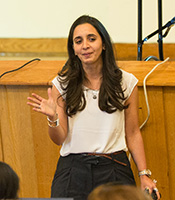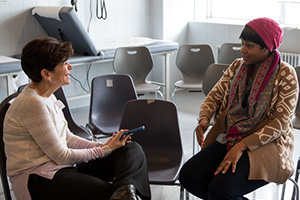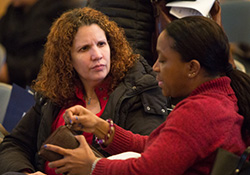

Working with Parents
Responding to Parents' Feedback: Workshop Offers Guidance and Means for Connecting
Einstein’s Children’s Evaluation and Rehabilitation Center (CERC) recently hosted its third annual Parent Workshop. The event brings together the parents of children with developmental disabilities for seminars, discussions and networking opportunities with clinicians and other parents.

Speech language pathologist, Noor Al Radi, addresses those assembled.The idea for the initial workshop was motivated by a desire to help parents in applying the practices they learn at CERC when working with their children at home. “Parents come in for the therapy with their children, and shared that they often have difficulty with what they are able to do at home,” explained Tammy Fried, a CERC social worker who was among the event’s organizers. “This workshop gives parents a chance to ask questions, receive feedback, and develop a sense of community with other parents who are experiencing the same things.”
This year’s event offered sessions presented by a team of CERC clinicians on topics including behavioral strategies, medication options, parenting skills and preparing children for social interactions and life transitions. To better address the needs of the local Bronx community, many sessions were presented in parallel English and Spanish forums.
Two new components also were introduced this year. These included panel discussions, during which several care providers discussed strategies and provided information relevant to education and self-care skills.

Deborah Meringolo, associate director of the Infant/Toddler Team at CERC, chats with parent Chantel Paige. During the education-focused panel, parents learned about identifying the right scholastic programs, engaging with their child’s teachers and finding support and resources at schools. The other panel addressed a variety of issues, such as toilet training, mealtimes, sleep schedules, dressing and dental hygiene.
Parental Input Central to Objectives
“The content for each of these panels was designed based on feedback we received from parents,” said Noor al Radi, a CERC speech pathologist who was among the program’s organizers. “The parents told us the kinds of issues that most interested and concerned them, and that information guided us in developing the workshop offerings.”
The second new component was called The POP Project: Parents on Parenting. Through POP, parents could document their thoughts and experiences about raising children with special needs. Those who participated recorded their responses to two prompts?“Tell me about the moment you found out about your child’s diagnosis" and “Tell me what it’s like to parent your child.” Each had the option of telling their stories by themselves, or having a clinician or another parent pose questions to them about their experiences.

Parents Donnette Reid and Isbel Gonzalez engage in conversationAllie Brudner, a CERC speech pathologist who helped to develop POP explained, “We wanted to give parents a chance to speak up and tell us about their experiences with parenting. They’re the real experts in a field like this, and we felt that making the audio recordings offered them a valuable opportunity to share the kinds of issues they are dealing with.”
POP is still under development, but there are plans to transcribe the audio recordings and make them available as part of an online library that can be accessed by researchers, clinicians, social workers and other parents.
Expanding the Network
Since its first offering three years ago, attendance at the CERC Parent Workshop has almost tripled? from 30 attendees the first year to nearly 90 this year.
“We’re thrilled by the turnout and response from parents,” said Diana Rodriguez, a CERC social worker and another of the event organizers.
“The workshop offers a valuable resource to parents from the Bronx and our surrounding communities whose children have special needs.” added Alex Nussbaum, a CERC speech pathologist and other event organizer. “It’s our hope that in showing parents that they have a community of empathic, supportive peers to communicate with, the challenge of raising a developmentally disabled child will seem a little easier to manage.”
Posted on: Monday, May 11, 2015

Tablet Blog